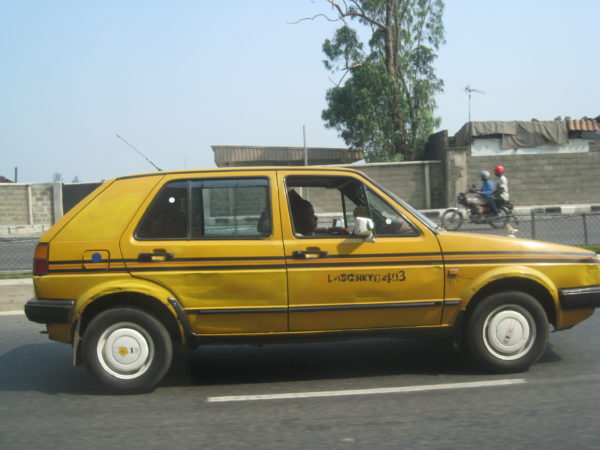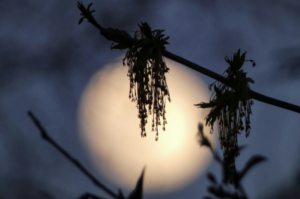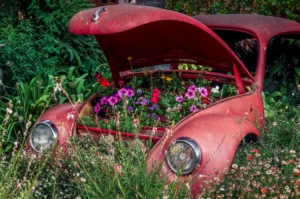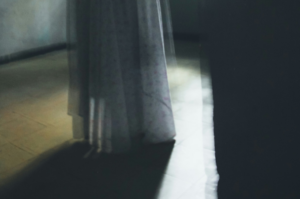 There are little less than a dozen means through which Lagosians move themselves around the city—from hanging on a locomotive train to lounging in the back seat of an Uber.
There are little less than a dozen means through which Lagosians move themselves around the city—from hanging on a locomotive train to lounging in the back seat of an Uber.
While some means are peculiar to specific areas of the city, an average Lagosian traveler uses the Bus Rapid Transit (BRT) system. These are China brand buses introduced little less than a decade ago to phase-out the Molue. The Molue, also known as the Danfo, are 1990 Volkswagen vans which have always been around as far back as one can remember. There is also the tricycle, called Keke Napep. NAPEP was a national program by the government in 2011 aimed at eradicating poverty. The motorcycle, Okada, the most expedient and the most dangerous, came fully into the picture as a result of an economic downturn in the country in the late ’80s. The bicycle has virtually been wiped out. It used to be a major means in the ’60s and ’70s, but today, it would be sheer suicide to ride bicycles on Lagos roads.
In times of straining economic hardship as this, however, people also have learnt to put their legs to use. They trek half of the journey and then pay for some means of transportation. Few Lagosians use the waterways, which are mostly leveled-out and free, except for weeds. The train, too, is very limited to parts of the city with existing and functioning old railways: Iyana Ipaja through Oshodi to Oyingbo.
The Molue, though, is yet to be totally phased-out as it still remains the cheapest means of all as regards the distance to be covered. They ply the very congested areas of Oshodi to Mile-Two, among others. In the early ’70s, they had birthed Fela Anikulapo’s lyrics in ‘Suffering and Smiling’. It was in the Molue that Fela saw forty-nine people sitting and ninety-nine people standing, suffering, yet smiling. The Molue remains the one place to find true Lagosians.
The reincarnated Molue is not painted in the familiar colors of yellow accented with black stripes. These days they retain the white color they had when they were imported from Europe. And they come very old, making their whites dirty and rough. Their bodies are patches of welding. Aside the very rickety trailers, notorious for accidentally dropping containers on smaller vehicles in the city, these Molues emit the darkest exhume into the atmosphere; with lousy engines and constantly falling and failing parts, they become the true beasts of Lagos roads.
There is no limit to the number of people the Molue would take at a time as long as there is space within or outside it to place one leg. On a trip from Oshodi to Mile-Two one afternoon, I was fortunate to be two steps away from being outside the bus and out on a fast moving tar. I had clung to the bus while it moved—that’s the typical way to go about boarding it. The man who hopped in after me, clad in a face-cap and stringed with a pair of earphones, fastened himself to the rim of the entrance; his feet were on the first step in. No doors. He had the whole of his body flying in the outside wind. The bus moved speedily. I wondered: How dangerous.
A glance back into the bus–an exercise that cost me a hostile look and a short hiss from a woman I bumped my head into, to whom I quickly apologised before she got on a high horse and start pulling strings—the raucous situation the whole place had become: a man with a megaphone stood and faced his ready-made audience as he advertised cosmetics and drugs. The commuters listened—as they must. Another man, old and tired, sat right on the dashboard almost facing the driver. He had his left hand under his chin in thought, staring dismayingly into vacuum. There was nothing left of the dashboard he sat on; all the navigating buttons were long gone. In their places were holes and naked wires. One could see naked working mechanisms of brakes and gears as the driver applied and reapplied them. Two live wires under his steering blew the horn when he intermittently joined and released them with a spark. Bodies of passengers blocked everywhere, denying him access to the passenger’s side mirror. So he called out each time to the conductor who, among a dozen jobs he did at a time, shouted out to him when to overtake or relapse to the service lane.
Then the conductor started moving between the swarm of humans as one would swim against a tide, holding the rail which ran through the length of the bus and collecting fares from everyone. I forced a note out my breast pocket, gave it to him and waited for my balance. He gave a piece of paper in return; a peculiar card not any larger than the size of a scrabble tile. It was a pass to getting my change when he has it. I muffled it in my left palm. He squeezed past onto the next person. And I returned to studying the people: young and old; neat and dirty; students and workers; beautiful and ugly.
I had initially thought that one must be very poor to subject themselves to the gruelling experience of a Molue, but I began to rethink when I saw that some of the younger folks operated expensive android phones, and some of the old folks ordered from the drug and cosmetic seller whose products ranged between one hundred to one thousand naira per product. Although some of the people were obviously poor, others, perhaps, just don’t deem it apt to pay a kobo extra on what Molue would charge for transporting themselves from one place to another.
The bus stopped; people alighted; others came in; the driver drove; and the conductor continued his hydra-headed duty. People lightened as we moved closer to the destination. The bus came to a last stop, but it didn’t totally stop. Commuters jumped out of it like they were on an emergency. The conductor was out with the last set of commuters he must settle. He gave a note to two people, which is so common in Lagos that it is called ‘marriage.’ The two fellows followed each other until they found a means to change the note to smaller denominations.
But, presently, there are several road and rail constructions going on in the city. In the coming years, there would be more means to move around in Lagos, but would they translate to exploring the cheapest means to travel around? Or would they remain on fares that would make inhabitants of the city stick to patronizing Molues?
**************
Post image by Nick M via Flickr.
About the Author:
 Dare Dan is a freelance writer and a spoken-word poet. He is a member of Lagos Film Society and writes for Lagos Film Review. His writing has appeared in Naij.com, olisa.tv, Africa in Words and musicinafrica.net. He lives in Lagos, Nigeria. Twitter handle: @damilaredan121.
Dare Dan is a freelance writer and a spoken-word poet. He is a member of Lagos Film Society and writes for Lagos Film Review. His writing has appeared in Naij.com, olisa.tv, Africa in Words and musicinafrica.net. He lives in Lagos, Nigeria. Twitter handle: @damilaredan121.









Swoosh January 04, 2017 14:41
I felt like I was on the molue too. Well written